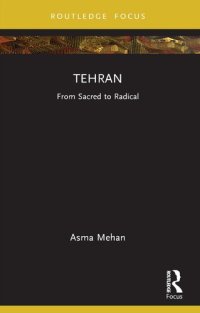
Ebook: Tehran: From Sacred to Radical
Author: Asma Mehan
- Genre: Art // Design: Architecture
- Series: Built Environment City Studies
- Year: 2022
- Publisher: Routledge
- City: London
- Language: English
- pdf
This book is an interdisciplinary research work designed to be of interest to a broad range of academics. The book examines the relationship between democracy and the (trans)formations of urban spaces through comparative perspective. It engages with the ideas of ‘modernity’ in architecture and investigates how they might align (or not) with other forms of radical power.
This book offers an understanding of the public spaces through political change, power struggle, and autocratic modernity manifested. It addresses the subject of politics in architecture and built environment by examining the various academic literature in urban studies, architectural history, urban anthropology, urban sociology, cultural geographies, planning history, philosophy, and the broader social and political sciences. Followingly, it will be focused on the less well-known traditions of architecture and democratic values drawing upon western and (non)western perspectives to decolonize the notion of public space in the global south. In better words, the book investigates the mechanisms of power struggles and the transformative dynamism of totalization and state-led modernization, which motivates or shapes a creative tension in the form of the city.
The topic of the work is novel and aims to examine the relationship between the affordances of public spaces, their micro-histories, and the emergence of critical social events and movements. The breadth of the topic demanded engagement with a rich body of architectural theory and history and relevant texts in urban sociology, colonial and postcolonial studies, political geography, and cultural studies, a challenge to which the book has responded outstandingly. The issue is urgent for policymakers and architects, urban designers, political and cultural geographers, and other practitioners working on the built environment to create more democratic public spaces in the global south.
This book offers an understanding of the public spaces through political change, power struggle, and autocratic modernity manifested. It addresses the subject of politics in architecture and built environment by examining the various academic literature in urban studies, architectural history, urban anthropology, urban sociology, cultural geographies, planning history, philosophy, and the broader social and political sciences. Followingly, it will be focused on the less well-known traditions of architecture and democratic values drawing upon western and (non)western perspectives to decolonize the notion of public space in the global south. In better words, the book investigates the mechanisms of power struggles and the transformative dynamism of totalization and state-led modernization, which motivates or shapes a creative tension in the form of the city.
The topic of the work is novel and aims to examine the relationship between the affordances of public spaces, their micro-histories, and the emergence of critical social events and movements. The breadth of the topic demanded engagement with a rich body of architectural theory and history and relevant texts in urban sociology, colonial and postcolonial studies, political geography, and cultural studies, a challenge to which the book has responded outstandingly. The issue is urgent for policymakers and architects, urban designers, political and cultural geographers, and other practitioners working on the built environment to create more democratic public spaces in the global south.
Download the book Tehran: From Sacred to Radical for free or read online
Continue reading on any device:

Last viewed books
Related books
{related-news}
Comments (0)